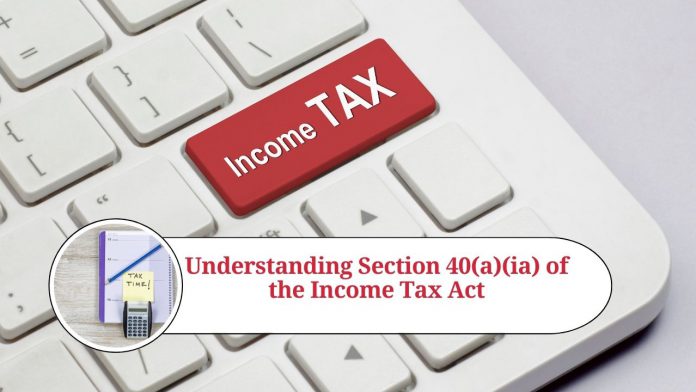Section 40(a)(ia) of the Income Tax Act, 1961, deals with disallowance of expenses in case of non-deduction or non-payment of tax deducted at source (TDS) by the deductor. In this blog, we will discuss the provisions of section 40(a)(ia) in detail and their implications on taxpayers.
Provisions of section 40(a)(ia) According to section 40(a)(ia), any sum paid by way of interest, commission or brokerage, rent, royalty, fees for professional or technical services or any other sum chargeable under the Income Tax Act, shall be disallowed in computing the income of the taxpayer, if the taxpayer fails to deduct or pay the TDS on such sum. This provision is applicable to both individuals and businesses.
Exceptions to section 40(a)(ia) There are certain exceptions to section 40(a)(ia) which are as follows:
- If the TDS has been deducted during the last month of the previous year and paid on or before the due date of filing the return of income, then the disallowance under section 40(a)(ia) shall not be made.
- If the TDS has been deducted during the current year and paid on or before the due date of filing the return of income, then the disallowance under section 40(a)(ia) shall not be made.
- If the taxpayer can prove that the payee has included the sum in his income and paid the tax thereon, then the disallowance under section 40(a)(ia) shall not be made.
Implications of section 40(a)(ia) on taxpayers Section 40(a)(ia) has significant implications on taxpayers as any expenses disallowed under this section shall be added to the taxable income of the taxpayer. This would result in an increase in the tax liability of the taxpayer. Therefore, it is crucial for taxpayers to ensure that they comply with the provisions of TDS and pay the same within the due dates to avoid any disallowance of expenses.
Conclusion
Section 40(a)(ia) of the Income Tax Act, 1961, is an important provision that deals with the disallowance of expenses in case of non-deduction or non-payment of TDS. It is essential for taxpayers to comply with the provisions of TDS and pay the same within the due dates to avoid any disallowance of expenses and increase in tax liability. Therefore, taxpayers should be aware of the provisions of section 40(a)(ia) and take necessary steps to ensure compliance.
Read more useful content:
- section 145 of income tax act
- section 10e of income tax act
- section 9 of the income tax act
- section 94b of income tax act
- section 206aa of income tax act
Frequently Asked Questions (FAQs)
Q:1 What expenses are covered under Section 40(a)(ia) of the Income Tax Act?
A: Any sum paid by way of interest, commission or brokerage, rent, royalty, fees for professional or technical services, or any other sum chargeable under the Income Tax Act, are covered under this section.
Q:2 What is the consequence of non-deduction or non-payment of TDS?A: If TDS is not deducted or paid, the expenses claimed against such payment would be disallowed under Section 40(a)(ia), and added to the taxable income of the taxpayer, resulting in an increase in tax liability.
Q:3 Are there any exceptions to Section 40(a)(ia)?
A: Yes, exceptions include TDS paid during the last month of the previous year and before the due date of filing the return of income, TDS paid during the current year before the due date of filing the return of income, and if the payee has included the sum in his/her income and paid the tax thereon.
Q:4 Is it necessary for individuals to comply with TDS provisions?
A: Yes, it is necessary for individuals to comply with TDS provisions if they are making payments that are covered under the TDS provisions.
Q:5 What should taxpayers do to comply with Section 40(a)(ia)?
A: Taxpayers should ensure that TDS is deducted and paid within the prescribed due dates, and they should keep proper documentation to prove compliance with TDS provisions.




















